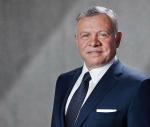You are here
King Abdullah’s visit to Moscow could pave the way for ending Syria’s crisis
Aug 24,2021 - Last updated at Aug 24,2021
Jordan’s King Abdullah is intensifying his diplomatic efforts to end the political stalemate in neighbouring Syria by seeking to put together a task force to engage the Syrian regime in a bid to change its behaviour. A month after he was the first Arab leader to meet with President Joe Biden and top US officials, he flew to Moscow this week on a working visit to discuss the Syrian crisis with President Vladimir Putin.
In a CNN interview aired while he was in Washington last month the King said that “[Syrian] refugees are not going to go back any time soon… and that takes us to the challenge that we are now discussing with the United States and the Europeans. Bashar [Assad] has legitimacy... and so the regime is there and we have to be mature in our thinking… is it regime change or behavioural change, and if it’s behavioural change then what do have to do to come together to talk to the regime because everyone else is doing it and there is no plan at the moment”. He said that the West should talk to the Russians who are playing a vital role.
The King has maintained a special relationship with President Putin over the years and has been a regular visitor to the Russian capital. The last time the two leaders met was in Sochi in October 2019, but they did speak on the phone last June. The two sides have a common view on the Palestinian Question and other regional issues and as they celebrate 58 years of diplomatic relations they seek to expand strategic, economic, cultural and military ties. Russia has supported Jordan’s position on the two-state solution and the King’s role as custodian of holy places in East Jerusalem. Even though Jordan is a close ally of the United States, the King has been able to maintain close coordination with the Russian leader especially in Syria following the eruption of the civil war there.
That has helped Amman get a pledge from the Russians to keep pro-Iranian militias in southern Syria away from the Jordanian borders. Jordan has been quick to appreciate the geopolitical shifts in the region especially following the Russian military intervention in Syria in 2015. Jordan has backed Russian efforts to launch a political process in Syria and has attended a number of these meetings as an observer.
Talks between the two leaders have covered the crisis in Daraa where Syrian regular army backed by the Russian military is besieging the old town where Syrian rebels are entrenched. The fall of Daarra to the rebels last month has forced the Jordanian side to close the border crossing days after it was fully reopened. Jordan had hoped to revive trade with its northern neighbour. It is believed that the King had asked Biden for a waiver from sanctions under the Caesar Act. For Jordan, reopening the trade route to the north is vital for its ailing economy.
Jordan has been a hub for diplomatic activity recently with visits to Amman by the Saudi, Turkish and Qatari foreign ministers in recent weeks.
In a related development the King and Putin have discussed the US offer to supply Lebanon with Jordanian electricity through Syria in a bid to alleviate the acute energy shortage facing Lebanon. The US gesture came in response to previous Jordanian requests, which were rejected by the former US administration. To resolve this issue logistically, Jordan will have to coordinate closely with the Syrian regime. The move will be supported by Egypt, which will be supplying Amman with additional quantities of natural gas.
This could be key to reengaging the regime with Russian support. It could pave the way for further steps towards normalising ties with Damascus in return for concrete steps to revive the political process. Amman also hopes to take the lion’s share of future reconstruction deals especially in southern Syria. Jordan also hopes to create positive conditions in that region that will encourage hundreds of thousands of Syrian refugees which the Kingdom hosts to return voluntarily. Jordan has had to adapt to a decrease in foreign aid to assist it in responding to the Syrian refugee crisis.
It is also believed that vv’s efforts are backed by a number of Gulf states that would like to see an end to the Syrian crisis with the hope of limiting Iranian influence over Damascus. Jordan, Iraq and Egypt have formed a trilateral economic bloc and hope that Syria could join in the future.
King Abdullah is leading efforts to create a new understanding of the Syrian crisis that would pave the way to end the decade-old civil war and open the way for a new chapter that would rehabilitate the regime and launch a political process with the aid of the Russians.
Osama Al Sharif is a journalist and political commentator who is based in Amman












